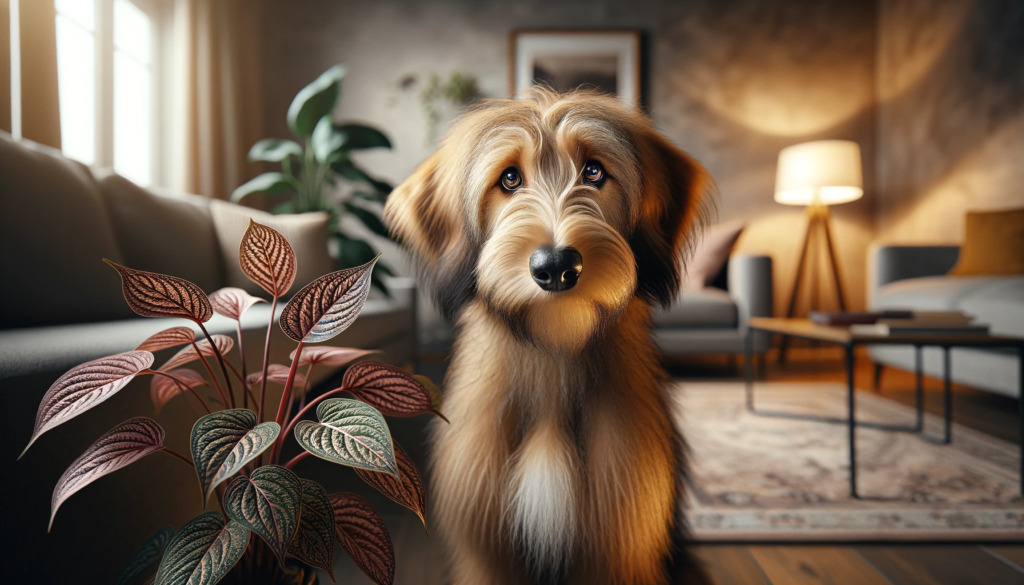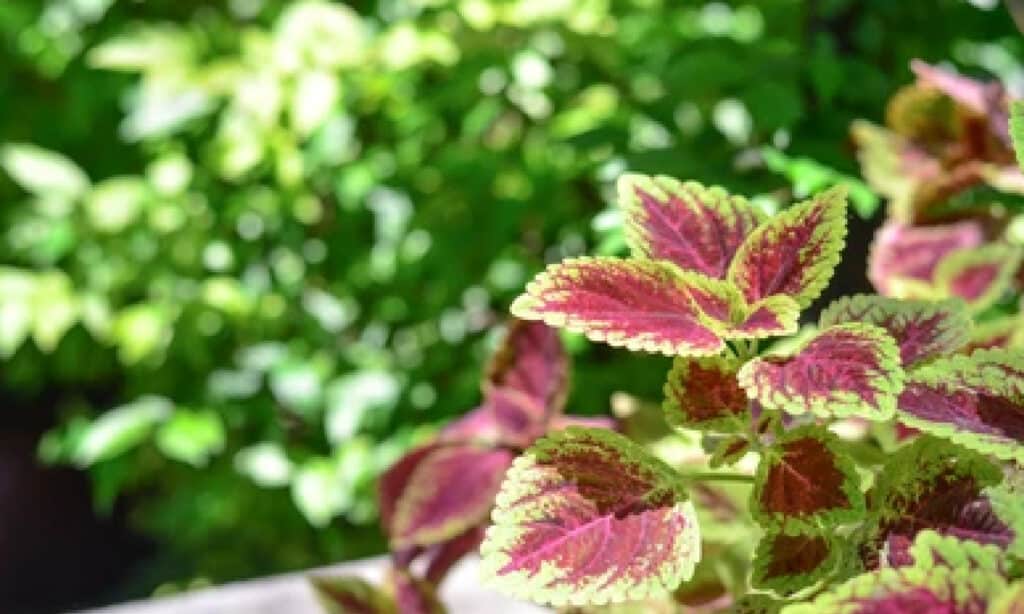If you’re a plant lover and a dog owner, you might have wondered if some of your indoor or outdoor plants can be harmful to your furry friend. Coleus, a popular ornamental plant known for its colorful foliage, is no exception. In this blog post, we’ll answer the question on many dog owners’ minds: Are Coleus toxic to dogs? We’ll also explore what you should do if your dog eats Coleus, the potential physical dangers that the plant presents, signs and symptoms of ingestion, and when to take your dog to the vet. Additionally, we’ll provide tips on how to prevent your dog from eating Coleus, and lastly, we’ll delve into the reasons why dogs are drawn to this plant. Keep reading to learn everything you need to know about Coleus and your furry friend’s health.

What Are Coleus
Coleus is a type of plant that is also known as Solenostemon. These plants are tropical and belong to the mint family, Lamiaceae. What makes them so popular are their eye-catching, colorful leaves, which can come in shades of green, purple, pink, yellow, and red. People often use Coleus plants for decoration, whether it’s for landscaping, container gardening, or indoor arrangements. Coleus plants originally come from Southeast Asia and have been grown for centuries for both their medicinal and ornamental uses. There are many different types of Coleus plants, and they come in a range of sizes, from small potted plants to large shrubs. Taking care of Coleus plants is relatively easy as they do well in warm, humid environments, require moderate watering, and prefer indirect sunlight.
Are Coleus Toxic To Dogs?
Yes, if dogs eat Coleus plants, it can cause them harm. These plants contain oils and chemicals that are not good for dogs and can lead to various symptoms such as vomiting, diarrhea, loss of appetite, excessive drooling, and dehydration. In severe cases, ingesting Coleus can even cause dogs to feel tired, muscle tremors, seizures, and death.
The amount of damage Coleus can do to your dog depends on how much they eat and their size. Larger dogs might handle small amounts of ingestion, while smaller dogs can be badly affected even by a little bit. It’s vital to make sure Coleus plants are kept away from dogs and other pets to avoid them accidentally eating them.
If you think your dog has ingested Coleus, take them to see a vet right away. Treatment may involve induced vomiting, activated charcoal to soak up toxins, intravenous fluids to rehydrate, and medicine to manage symptoms. Getting help as soon as possible will give your dog the best chance of a full recovery.

What Should You Do If Your Dog Eats Coleus?
If you suspect that your dog has eaten Coleus, it’s crucial to act quickly. The first step is to remove any remaining plant material from your dog’s mouth and call your veterinarian immediately. Your veterinarian will ask about the symptoms your dog is showing and may advise you to bring your dog in for an examination.
In some cases, your veterinarian may recommend inducing vomiting to help remove any remaining plant material from your dog’s stomach. This is typically done within two hours of ingestion, and it’s essential to follow your veterinarian’s instructions carefully.
If it’s too late to induce vomiting or if your dog is already showing symptoms, your veterinarian may recommend other treatments. These can include administering activated charcoal to absorb toxins in the stomach, providing intravenous fluids to rehydrate your dog, and giving medication to manage symptoms such as vomiting and diarrhea.
In severe cases, your dog may need to be hospitalized for monitoring and supportive care, such as oxygen therapy or intravenous medication.
Remember, prevention is always the best medicine. If you have Coleus plants in your home or garden, make sure they are kept out of reach of your dog to prevent accidental ingestion. If you suspect that your dog has ingested any toxic substance, don’t wait for symptoms to develop – call your veterinarian right away. Early intervention can make all the difference in your dog’s health and recovery.
Potential Physical Dangers Presented by Coleus
There are several potential physical dangers presented by Coleus plants, especially when ingested by dogs. These plants contain essential oils and chemicals that can cause various symptoms, including gastrointestinal distress, lethargy, muscle tremors, seizures, and even death.
Ingesting Coleus plants can cause vomiting, diarrhea, and loss of appetite in dogs. These symptoms can lead to dehydration, which, if left untreated, can be life-threatening. In severe cases, dogs may experience muscle tremors, seizures, and respiratory distress, which can require emergency medical attention.
The toxicity of Coleus plants varies depending on the size of the dog and the amount ingested. Smaller dogs are more susceptible to the toxic effects of Coleus than larger dogs. It’s crucial to keep Coleus plants out of reach of dogs to prevent accidental ingestion.
Other physical dangers of Coleus plants include skin irritation and allergies. The essential oils in the plant can cause a rash or other skin irritations in both dogs and humans. If you notice any skin irritations after handling Coleus plants, wash the affected area immediately with soap and water.
It’s essential to be aware of the potential physical dangers of Coleus plants and take steps to prevent accidental ingestion by dogs. If you suspect that your dog has ingested Coleus, seek veterinary care immediately to prevent the onset of severe symptoms.

Signs and Symptoms of Coleus Plant Ingestion
If your dog ingests Coleus, there are several signs and symptoms that you should watch out for. These symptoms can range from mild to severe, depending on the amount of plant material ingested and the size of your dog.
Some of the common signs and symptoms of Coleus plant ingestion in dogs include:
- Vomiting
- Diarrhea
- Loss of appetite
- Excessive drooling
- Lethargy
- Dehydration
- Muscle tremors
- Seizures
- Difficulty breathing
It’s important to note that these symptoms can appear quickly or over time, depending on the severity of the ingestion. If you notice any of these symptoms in your dog and suspect they have ingested Coleus, seek veterinary care immediately.
In some cases, your dog may not show any symptoms for several hours after ingestion. It’s essential to keep an eye on your dog and monitor them closely for any changes in behavior or signs of distress.
Remember, prevention is always the best medicine. Keep Coleus plants out of reach of your dog to prevent accidental ingestion and monitor your dog closely for any signs of illness. If you suspect that your dog has ingested any toxic substance, don’t wait for symptoms to develop – call your veterinarian right away.

When Should You Take Your Dog To The Vet?
If you suspect that your dog has ingested Coleus plants, it’s essential to seek veterinary care immediately. The sooner your dog receives treatment, the better their chances of a full recovery.
You should take your dog to the vet if they are showing any of the following symptoms:
- Vomiting
- Diarrhea
- Loss of appetite
- Lethargy
- Dehydration
- Muscle tremors
- Seizures
- Difficulty breathing
Even if your dog is not showing any symptoms, it’s still a good idea to call your veterinarian for advice. They may recommend monitoring your dog closely for any changes in behavior or signs of distress.
When you take your dog to the vet, be sure to provide as much information as possible about the ingestion, including how much plant material your dog ingested, when they ingested it, and any symptoms they are exhibiting. This information will help your veterinarian determine the best course of treatment.
In some cases, your veterinarian may recommend inducing vomiting to help remove any remaining plant material from your dog’s stomach. They may also administer activated charcoal to absorb any toxins in the stomach and provide intravenous fluids to rehydrate your dog.
If your dog is experiencing severe symptoms, they may need to be hospitalized for monitoring and supportive care, such as oxygen therapy or intravenous medication.
Prevention Is The Best Medicine – How To Prevent Your Dog from Eating Coleus
Prevention is the best medicine when it comes to keeping your dog safe from the potential dangers of Coleus plants. Here are some tips on how to prevent your dog from eating Coleus:
- Keep Coleus plants out of reach: Make sure that any Coleus plants in your home or garden are kept out of reach of your dog. Consider placing them on high shelves, hanging them from the ceiling, or using plant stands to elevate them.
- Use barriers: Protect your dog from Coleus plants in your garden with barriers like fencing or netting.
- Supervise outdoor time: Supervise outdoor dogs to prevent access to Coleus plants.
- Use deterrents: Consider using natural deterrents such as citrus spray or cayenne pepper around your Coleus plants to discourage your dog from eating them.
- Provide alternatives: Give your dog safe and healthy alternatives to chew on, such as toys or bones, to keep them occupied and away from Coleus plants.
- Educate yourself: Learn to identify Coleus plants and other toxic plants that may be growing in your home or garden. This knowledge will help you keep your dog safe and avoid any potential accidents.
By taking these preventative measures, you can help keep your dog safe from the potential dangers of Coleus plants.

So, Why Do Dogs Eat Coleus?
The reasons why dogs eat Coleus plants are not entirely clear, but there are a few possible explanations. One is that the plant’s sweet aroma and taste can be appealing to dogs, especially those with a heightened sense of smell.
Another possible reason is that dogs have a natural instinct to explore their environment and satisfy their urge to chew. This may lead them to investigate and nibble on Coleus plants out of curiosity.
Additionally, some dogs may eat Coleus as a form of self-medication for digestive or other health issues. However, it’s important to note that dogs don’t have the same knowledge as humans when it comes to self-medicating, and some plants can be harmful to them.
Regardless of the reason why your dog may be drawn to Coleus, it’s crucial to take preventative measures to keep them safe. Make sure to keep Coleus plants out of reach and provide your dog with safe alternatives to chew on. If you suspect that your dog has ingested any toxic substance, don’t hesitate to seek veterinary care right away.

Conclusion
In conclusion, while Coleus plants can be a beautiful addition to your home or garden, they can be potentially dangerous to your furry friend. The essential oils and chemicals in these plants can cause various symptoms, including vomiting, diarrhea, lethargy, seizures, and even death, if ingested by dogs.
Prevention is the key to keeping your dog safe. By keeping Coleus plants out of reach, using barriers, supervising outdoor time, and providing safe alternatives to chew on, you can significantly reduce the risk of accidental ingestion. Additionally, it’s crucial to learn to identify toxic plants and seek veterinary care immediately if you suspect that your dog has ingested any toxic substance.
By taking these preventative measures, you can help ensure your dog’s safety and well-being. Remember, your dog’s health is in your hands, and the best way to keep them healthy is to take proactive steps to prevent accidents from happening. So, if you’re a dog owner and have Coleus plants around your home or garden, make sure to take the necessary precautions to keep your furry friend safe.
~Sheena
